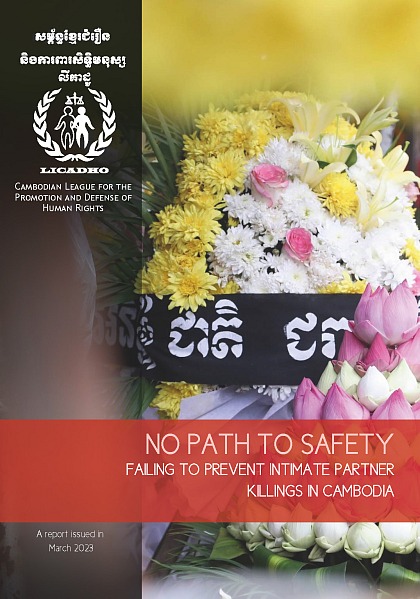No Path to Safety: Failing to Prevent Intimate Partner Killings in Cambodia
Released in March 2023| Download this report in English (PDF, 1.19 MBs) | |
| Download this report in Khmer (PDF, 1.46 MBs) | |
| Listen to audio version in Khmer |
LICADHO has today published “No Path to Safety: Failing to Prevent Intimate Partner Killings in Cambodia”, a report on the murders of 26 women and five children committed by current or former intimate partners between January 2020 and June 2022.
Violence against women is one of the most pervasive human rights violations in Cambodia, yet a flawed and often unenforced legal framework frequently allows violence to continue and escalate. Too often, this leads to murder. Today, LICADHO is demanding change.
Cambodia’s systems of prevention and response must be overhauled to protect women and children across the country who are either experiencing domestic violence, or are at risk of it. They must be offered clear routes to safety that enable them to live their lives free of violence.
“Protections and services empower women to safely leave abusive relationships,” said Pilorge Naly, LICADHO’s Outreach Director. “It is essential that these are available and women are informed of the legal rights and options they are entitled to during these crucial moments.”
“No Path to Safety” explores the systemic failures that contributed to the deaths of these 26 women and five children. While not representative of the total prevalence of domestic violence in Cambodia, its findings indicate that gender norms not only underpinned and fuelled this violence, but also plague the institutions that failed to respond. More than half of the murdered women had faced prior acts of domestic violence before they were killed; many of them faced social, cultural and economic obstacles to reporting violence. When they did reach out, interventions by authorities were consistently ineffective.
Mediation in Cambodia is too often used as an excuse to push reconciliation at all costs. It is simply not effective at ending violence. The Domestic Violence Law needs to be significantly amended, and there must be accountability for authorities who fail or refuse to intervene.
Am Sam Ath, Operations Director of LICADHO
In at least 11 cases, authorities were aware of violent behaviour or the woman’s decision to end the relationship. Not a single woman received effective protection or support. Instead, unfair divorce procedures left too many women unable to escape violence, while at least six perpetrators had been engaged in unproductive sessions of conciliation or education.
The killings documented in this report have been met with inconsistent legal procedures and outcomes, with multiple families still waiting for justice. Sixty-five percent of the cases explored in this report had reached a conviction by a court of first instance as of January 2023, with other suspects remaining at-large, in pre-trial detention or deceased. “There was no intervention. They [authorities] did not come,” said the mother of a woman who was killed by her former husband. “My daughter is dead and the perpetrator is still free.”
The flaws in the 2005 Law on Prevention of Domestic Violence and Protection of Victims have been widely and repeatedly raised by civil society. No meaningful effort has been made to address them since its enactment nearly 20 years ago.
“The Cambodian government must immediately take action and provide all women in Cambodia with safe paths to a life free of violence,” said Am Sam Ath, LICADHO’s Operations Director. “Mediation in Cambodia is too often used as an excuse to push reconciliation at all costs. It is simply not effective at ending violence. The Domestic Violence Law needs to be significantly amended, and there must be accountability for authorities who fail or refuse to intervene.”
For more information, please contact:
▪ Am Sam Ath, Operations Director of LICADHO, on Signal at (+855) 10 327 770 (Khmer)
▪ Pilorge Naly, Outreach Director of LICADHO, on Signal at (+855) 12 214 454 (English)








